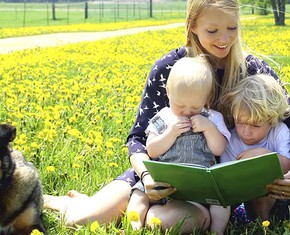The views expressed in our content reflect individual perspectives and do not represent the authoritative views of the Baha'i Faith.
When my friend Gordon asked me “What do you fear most?” a whole host of things went through my mind. If you consider the question for a moment, I’m sure you can come up with a few of your own fears, too.
Here’s one: spiders. When I was a really little toddler, outside playing one summer without a shirt on, I felt something on my back. I looked, and there, climbing up my skin, was the biggest, scariest spider I’d ever seen, just inches from my face.
I screamed, jumped up and ran. The spider probably did, too. When I got inside the house, crying and afraid, I found my mother, who took me into her arms and comforted me. “Spider!” I told her, sobbing and scared. “It’s all right,” she said, “the bad spider is gone.”
I’ve never forgotten the fright I felt at that moment (and I still don’t like spiders). Thinking about that incident as an adult, though, makes me wonder about fear itself. One of our most basic emotions, linked directly to our survival instinct, fear comes from the oldest part of our brains, the amygdala.
Everyone fears pain and injury, but we have many other fears, too—some obvious and some not so apparent. A 2005 Gallup survey of the fears of adolescents between the ages of 13-17 revealed this top ten list of fears: terrorist attacks, spiders (see what I mean?), death, being a failure, war, criminal or gang violence, being alone, the future and nuclear war. Babies have an innate fear of falling, and lots of adults have a fear of heights.
Have you ever given a speech to a crowd of people? Fear of public speaking, called glossophobia, afflicts many if not most people.
We all fear suffering, pain and death. Nobody wants to suffer. But life is suffering, the Buddha said, and part of life is learning to accept its existence—and to overcome the fear of suffering.
After all, the Baha’i teachings say, suffering comes from the material world:
…all the sorrow and the grief that exist come from the world of matter—the spiritual world bestows only the joy!
If we suffer it is the outcome of material things, and all the trials and troubles come from this world of illusion.
For instance, a merchant may lose his trade and depression ensues. A workman is dismissed and starvation stares him in the face. A farmer has a bad harvest, anxiety fills his mind. A man builds a house which is burnt to the ground and he is straightway homeless, ruined, and in despair.
All these examples are to show you that the trials which beset our every step, all our sorrow, pain, shame and grief, are born in the world of matter; whereas the spiritual Kingdom never causes sadness. A man living with his thoughts in this Kingdom knows perpetual joy. The ills all flesh is heir to do not pass him by, but they only touch the surface of his life, the depths are calm and serene. – Abdu’l-Baha, Paris Talks, p. 109.
We fear, then, the difficulties and suffering the world of matter inevitably brings us. We fear failure—but no one succeeds at everything. We fear unhappiness—but suffering always intrudes into every life. We fear illness—but no one stays healthy forever. We fear the future—but the future arrives no matter what we do. We fear death—but everyone gets one life and one death. Perhaps our fears and our suffering, Abdu’l-Baha suggests, have a deeper spiritual purpose:
The mind and spirit of man advance when he is tried by suffering. The more the ground is ploughed the better the seed will grow, the better the harvest will be. Just as the plough furrows the earth deeply, purifying it of weeds and thistles, so suffering and tribulation free man from the petty affairs of this worldly life until he arrives at a state of complete detachment. His attitude in this world will be that of divine happiness. Man is, so to speak, unripe: the heat of the fire of suffering will mature him. – Ibid., p. 178.
So how can we live a life free of fear? How can we eliminate it from our consciousness, or at least minimize it? How can we become personally fearless, facing the world and everything in it with confidence and courage?
In the treasuries of the knowledge of God there lieth concealed a knowledge which, when applied, will largely, though not wholly, eliminate fear. This knowledge, however, should be taught from childhood, as it will greatly aid in its elimination. Whatever decreaseth fear increaseth courage. – Baha’u’llah, Epistle to the Son of the Wolf, p. 32.
In this striking passage, Baha’u’llah seems to say that we can eliminate most of our fears and increase our courageousness by accessing the knowledge given to us in the spiritual teachings of God. In the next installments of this series on fear, let’s search for that knowledge in the Baha’i teachings and see what we can discover.
Next: Animal Fear and Moral Courage
















Comments
Sign in or create an account
Continue with Googleor